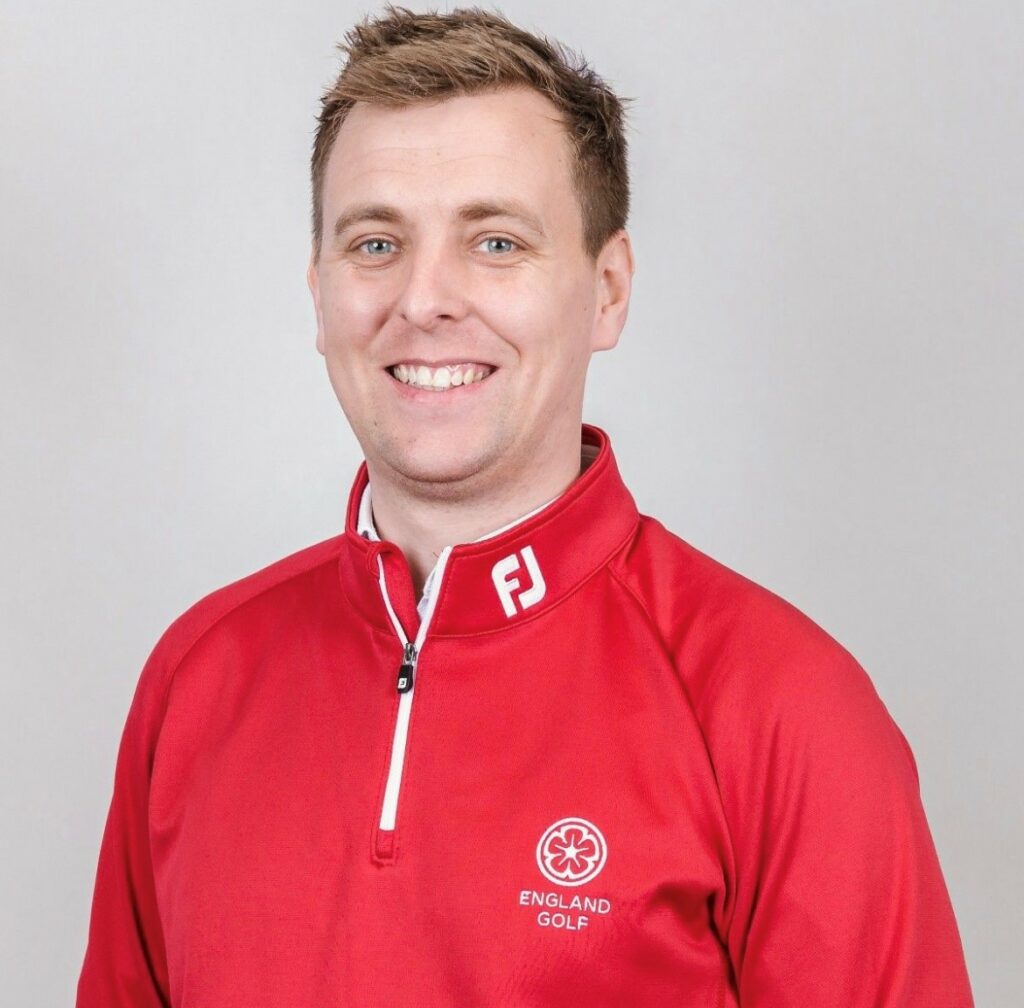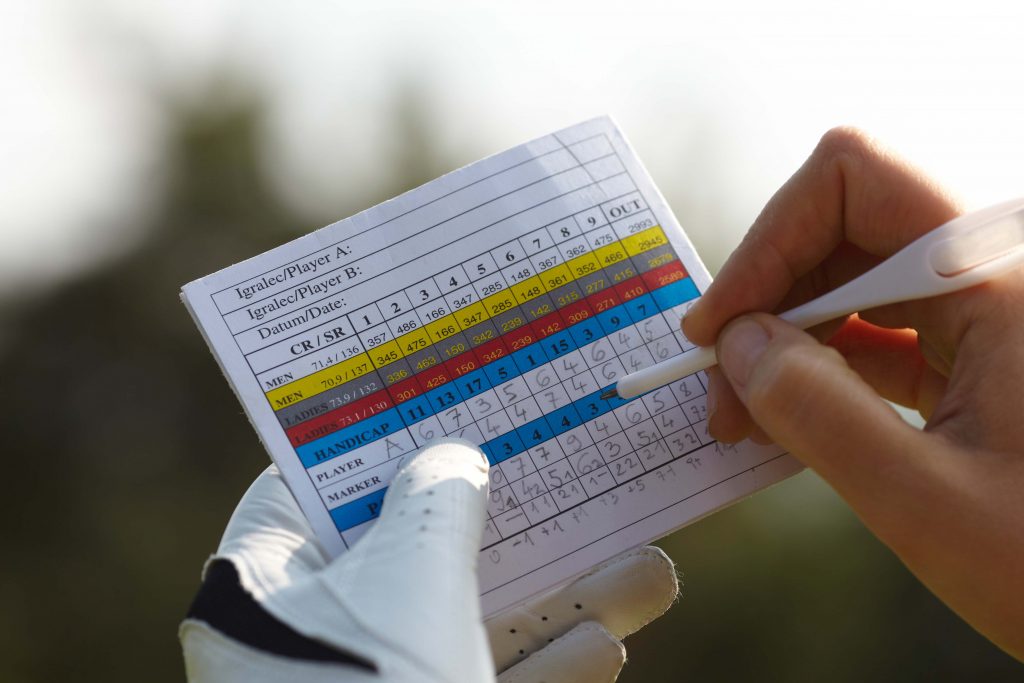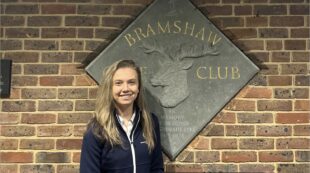James Luke is England Golf’s new Head of Handicapping and Course Rating. He talks to GCMA Insights about his motivations, plans, and how the governing body is moving forward with the World Handicap System…
This article is part of GCMA Insights – topical content for golf industry professionals, discussing the things that matter to those who work in golf clubs.
They say being England men’s football manager is the impossible job. Clearly they’ve never spent time convincing some disgruntled golfers about the merits of the World Handicap System.
Just typing WHS into a search engine can reveal a torrent of dissatisfaction and a long list of words impossible to print here.
Social media can be an echo chamber but it is not a stretch to say the biggest change in a century to way golfers in Great Britain & Ireland tee it up has split opinion in a few quarters.
It takes a strong character to willingly try to change the hearts and minds of some of those most stridently against WHS.
So step forward James Luke, who has recently taken on the mantle of England Golf’s Head of Handicapping and Course Rating. He has succeeded Gemma Hunter, who steered the governing body through the introduction of the system – which launched here in November 2020 – and has moved on to a handicapping role at the R&A.
Get involved in the debate.
To join the GCMA, click here, or to organise a call with a member of the GCMA team, just complete the form below.=
GCMA Insights sat down with James to learn more about his background, the next steps forward for WHS, and England Golf’s plan to convince the non-believers…
You’ve come into one of the more important jobs in club golf. Can you tell us a little bit about your background?
I’ve always been a club golfer – at one club: Brancepeth Castle in Durham. I was possibly one of the youngest people on their committee when I joined it a few years ago and, essentially, when the World Handicap System was coming in, I saw that as an opportunity to get more involved with the club.
There was one person who did the handicaps and I realised he needed a bit of support, especially with WHS, as there were a lot of new rules and education needed for golfers. That’s when I started to get more involved with the committee. I also did a lot of junior liaison officer work as well.
In terms of my working background, I spent 13 years in the NHS – initially on wards with patients before moving on to operational and strategic roles in project management primarily working on transformation, business change projects and in my last year working within data and digital environment.
That involved working closely with hospitals, CCGs and various other healthcare services and analysing where improvements were needed and putting in the processes to action them.
When I saw the position at England Golf as Head of Handicapping and Course Rating, I looked at the skill sets required and I felt it matched me and my personality exactly and it was the chance to go into an industry which I’m extremely passionate about.

Clearly golf and the NHS are two very different industries. But you saw parallels in the work you were doing that could also apply to golf?
My predecessor, Gemma Hunter, and the rest of the team did a lot of great work introducing WHS, which was a major change to the sport and a lot of my work in the NHS was all about change management and improvement-based projects. Immediately I saw the parallels in the skill sets required, it’s just a different subject.
Latterly, that was about digital innovation and digital technology and I think that’s where the two roles marry up. It’s now about, ‘how do we take things to the next stage?’
It’s about how I can plan, put in timelines, deadlines, and responsibilities. Relationship management is quite key in this role. England Golf has its processes and we’ve also got counties, clubs, and golfers. It’s about dealing with a lot of different people. It’s actually very similar to what I was doing but in a different subject.
It’s about utilising where those skill sets are, discovering who’s got the intrinsic knowledge about handicapping and course rating, for example, and tapping into that knowledge and growing it further.
How important is it to have been at the coalface at the start of WHS? You’ve worked at your club during the implementation and, obviously, the first couple of years since its introduction. You can see it from a strategic viewpoint but also as a club golfer would too…
That’s one of the key advantages of the whole team. I was very much involved at a club level. Mike [Greener, handicap co-ordinator] was a previous county captain and Jonathan [Ward, course rating co-ordinator] was a previous county secretary.
We’ve spoken to lots and lots of golfers, both in our county and in what we do now, and it’s essential we know how golfers think, or that we have a feeling how they do, and understand what drives them. What makes them happy? What do they want to know? It’s all about that relationship management.
You’re obviously positive about WHS – otherwise you wouldn’t have taken this job – but what are your thoughts on the new system and how do you feel the first couple of years have gone?
It was a big change. I like to know the inner workings of things so, with the old system, I’d finish a round and immediately I’d know whether it was going to be .2 or .4 reduction or add .1 on. I knew exactly where my handicap was going to be.
With the new system, it was all about getting more people into the game and playing golf. Ultimately, it has done that.
There are a lot of resources and tools – not just for golfers, but also for clubs and counties to be able to support implementation and retention and recruitment of new players. I think it’s a great system and it’s a fairer system. There are rules in place to make sure it’s a fairer system.
Part of my role, is to ensure golfers, clubs and counties know the rules and their responsibilities, what they can and can’t do, and have access to the support if they need it.
WHS began in the middle of a pandemic and the first year saw lots of restrictions imposed on golfers. Will the potential of the system only be realised now?
It arrived during a pandemic and lockdowns and, in terms of educating golfers, it had to be a different way of doing it: Teams and Zoom meetings and so on.
Now we’re not restricted by how many people we can have in a room. We can really get out there and start doing those educational pieces. Handicap committees and counties are becoming more knowledgeable and we can really get into where they need support.
That’s been apparent with the workshops we’ve been doing up and down the country. Clubs do need support, they come to us to provide that, and we’re able to guide them in what they can and can’t do within WHS. It’s a big learning curve right now.
There’s clearly a tranche of people resistant to WHS. How do you counter that? Is it about education?
Yes it’s about the education but we only ever hear the negatives, I want to start talking about the positives! There are a lot of success stories and I want to hear about them – what’s been really good about it and why, how it’s getting more people into the game, how it’s getting more juniors into the game, and how it’s encouraging people to play together.
One of things we’re looking at in the workshops is the rating of tees for men and women so we can ensure if a husband and wife want to play together at 9am, and in a competition, they can do that. It’s just golf at the end of the day. Who you play with is irrelevant.

Are you seeing more golfers playing in competitions? Are you seeing lots of general play scores?
There are more than 18 million scores that have gone into the MyEG app now. We can see that more and more people are wanting to play golf and to learn how to play golf. England Golf can now look at the education we provide and develop pathways from an iGolfer to becoming a club member.
If you look at some basic statistics, eight per cent of iGolfers end up being in a club. That’s really positive. It’s a small data sample but the more scores that are entered means the more data we’ve got to work with and to know how many scores are returned by males, females, and different age groups.
We can target education to those specific groups. For example, Girls Golf Rocks is a big project for England Golf because we want to get more women into the game. We know we need to do that because the data tells us that.
What does the future hold? Where would you like to see England Golf progressing with WHS?
I just want to see people enjoying their golf. We’re the only nation who really cares about their handicap. It’s like an ego thing, ‘what’s your handicap? 11, five, scratch?’ We want people to enjoy playing golf, go to the golf course, declare their intent (if they wish), pop their card in and have fun. They’ll then have a Handicap index relevant to their playing ability.
We need to move away from the negative stories and become a more inclusive and positive game.
Why do you think we are so obsessed with our handicap?
It’s culture, isn’t it? That’s probably been the biggest shock with WHS because we predominantly play competition golf and single stroke play. In America, it’s match play and 9-hole scores, in Europe and Australia it’s Stableford.
There are different cultures throughout the world and ours has always been around medal stroke play. That has ultimately determined how good you are.
A handicap can be a great parameter to measure your improvement and current ability but it shouldn’t totally define you as a golfer. It’s about enjoying the game. The saying is that golf is a good walk spoiled. I say it’s a good walk made great!
WHY JOIN THE GCMA?
Membership of the GCMA unlocks a network of like-minded professionals, provides you with support in your professional and personal development, and provides you with a multitude of benefits. Whether that’s the tools that will help you to excel in your profession, or a wide range of services to support your wellbeing, signing up to the GCMA is joining a community.
Is that your biggest challenge for WHS to be a success? To change the culture of golf in England and become less competition focussed?
That’s already started to happen when you think of how many general play scores are being submitted, although 90 per cent of submitted scores are competition based. There is a bigger picture outside of handicapping and course rating and it’s the governance of how Counties and Clubs manage and operate.
It’s about them being more diverse and more inclusive. England Golf have the tools and resources to support, and there are so many initiatives such as Girls Golf Rocks and our network of Club Support Officers.
At the WHS workshops, we talk about handicap committee structures. It’s about getting those of different ability levels, different ages, different genders, together as a group and that transfers into the events clubs run.
There is nothing to stop clubs running a mixed tee event for the golfer who tees off further back, the golfer with a higher index who tees further forward, and also to include young people and both genders in that event. We’ve got the Mixed Tee calculator to help clubs.
It’s just an event, it’s meant to be fun. The competition software will process who comes first, second and third, providing clubs have different divisions and categories. It makes everything more inclusive, but the club have got to make sure their governance is in place. If they’re unsure reach out to their local Club Support Officer.
It’s been a rocky start. There’s been a pandemic, you perhaps haven’t been able to do the education you’d hoped, and when golfers finally returned they were straight into WHS with barely any transition. There has been opposition to it, but do you remain optimistic?
Yes, of course. It’s already a success story in terms of what’s been achieved. There are 500,000 people with the MyEG app. We know there are 800,000 golfers [with club membership] and 30,000 iGolfers.
This article is part of GCMA Insights – topical content for golf industry professionals, discussing the things that matter to those who work in golf clubs.
Get involved in the debate. To join the GCMA, click here, or to organise a call with a member of the GCMA team, just complete this form and we’ll be in touch!
Enquiries
"*" indicates required fields



